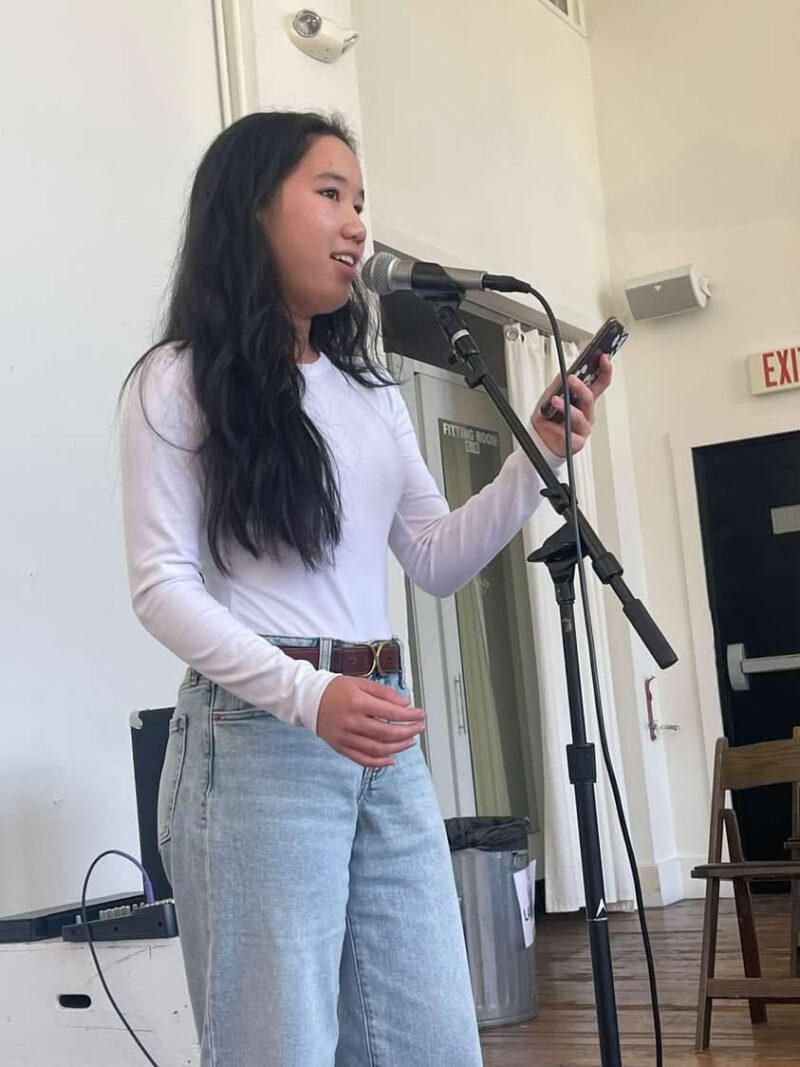Youth Performer on Empathy, Activism, and the Value of Teen Voices
Interview with Hannah Smith, Performer in ENOUGH! PLAYS TO END GUN VIOLENCE
Written by TeenTix Newsroom Writer Lorelei Schwarz

As she prepares for her roles at the Seattle Children’s Theatre (SCT) in teen-written plays about gun violence, fifteen-year-old Hannah Smith says the production process has been both informative and self-reflective. “This experience has made me realize that we do have voices,” she says, “and we will be listened to if we’re brave enough to use them.”
Smith, a Running Start student at Tacoma Community College, began acting last year at the Oregon Children’s Theatre before moving to the Seattle area. She’s part of a small class at SCT, along with two other teens. For the past six weeks, the group has been preparing to perform several short plays from ENOUGH! PLAYS TO END GUN VIOLENCE, which selects six pieces each year from young playwrights’ submissions to be performed at theaters across the country. The plays are slated to be performed for one night only, on November 6—exactly one year before the 2024 presidential election. Each play requires only a few actors or readers and provides a unique perspective on the issue of gun violence: one is about 911 operators trying to help during a shooting, while another tells the story of a girl who confronts the police in an attempt to save her brother from harm. Smith’s plays, Lightning Strike and The Matter at Hand, are similarly distinct takes on the issue.
The former, Lightning Strike, is about one school shooting’s only survivor, Hattie, and how she deals with the trauma and survivor’s guilt of that experience at different stages of her life, from the immediate aftermath to adulthood. The three versions of the character are each played by a different actor. Smith plays Hattie at age 31 and says she loves playing characters that carry resentment and inner turmoil, picking those emotions apart onstage. “I like digging into the psychological aspects, getting to explore the minds of characters who are trying to make their voices heard,” she adds. Though Smith’s never experienced a school shooting, the play invites her to question how she would react to that event in her own life—and puts her in the shoes of someone who has experienced gun violence in that direct, life-altering way.
The Matter at Hand, somewhat inversely, is a dark satire about three school administrators trying to figure out ways to prevent future shootings at their school. The adults, including a universally adored English teacher and a spiteful vice principal, are more or less blind to the effects of gun violence on their students. The play demonstrates and comments on, in Smith’s words, how administrators’ reactions to gun violence can be “very performative and without an actual positive impact on their students.” She’s playing the “airheaded” principal, who leans more toward superficiality than having genuine concern for her students’ safety. “I don’t feel like she’s reflective of who I am as a person,” Smith laughs, “but it’s fun for me to try to be somebody else, somebody so opposite to who I am.”
Though the behind-the-scenes work is primarily supported by adults, Smith has formed deep bonds with the other teens at SCT. “I feel like I’ve gotten to know them better as people and as the characters they play,” she says. “It’s easier to get to know them as characters when I know them as people.” The teens’ personal perspectives on gun violence are intertwined, in this theatrical environment, with fictionalized accounts and perspectives—which have also been created by teens. It’s a unique set of circumstances in which to discuss the effects of gun violence on young people. Though Smith had an atypical high school experience—almost entirely online, so no lockdown drills or physical safety concerns—it’s difficult nowadays to escape the reality of gun violence, especially as a teenager in America. “It makes gun violence feel more real to me, more tangible,” she says, now that she’s had the opportunity to discuss the issue with other young people and hear about their personal experiences throughout the rehearsal process.
The plays aren’t just for a teen audience; they can appeal to a wide range of people, Smith says, “which is what good theater does.” She thinks there are lessons to be learned for everyone. “For all generations, learning empathy and learning the value of activism, in a performance context or not, is really important.”
Lead photo credit: Hannah Smith performing in Bigfoot Regional Poetry Slam in Portland. Photo by Christopher Diaz.
The TeenTix Press Corps promotes critical thinking, communication, and information literacy through criticism and journalism practice for teens. For more information about the Press Corps program see HERE.
This reviews was written by a TeenTix Newsroom writer on special assignment through the TeenTix Press Corps.


